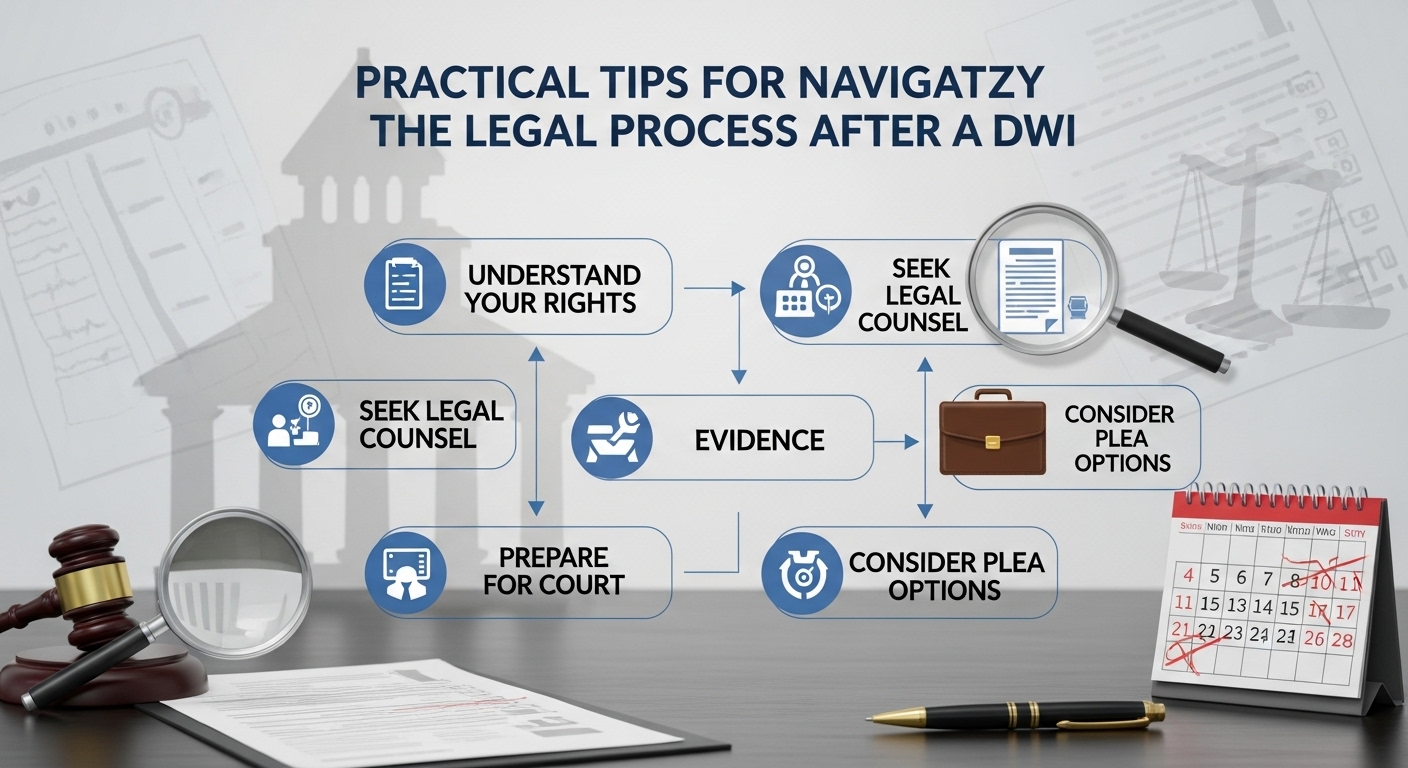Uncategorized
Practical Tips for Navigating the Legal Process After a DWI

Getting arrested for DWI feels terrifying. One bad decision and suddenly you’re facing serious legal problems that might affect your job, your finances, and even your freedom.
I’ve talked with hundreds of people going through this exact situation. They all ask the same questions:
What happens now?
Will I lose my license?
Do I need a lawyer?
How much will this cost me?
Let me break down what you need to know to get through this process with the least amount of damage to your life.
What Happens After You’re Arrested
The first 24-48 hours are a blur. After arrest, you’ll be taken to the police station for booking. They’ll take your fingerprints, photos, and personal information.
You might spend some time in a holding cell until bail is set. This varies by state, but usually you can be released once you pay bail or promise to appear in court (called “release on recognizance”).
You’ll leave with a court date and probably a temporary driving permit.
Write down everything you remember about your arrest while it’s fresh – what the officer said, how they conducted any sobriety tests, and how you were treated. These details might matter later.
Understanding Your Immediate Rights
From the moment of arrest, you have critical rights:
- The right to remain silent
- The right to refuse field sobriety tests in some states
- The right to call an attorney
- The right to refuse to answer questions without your lawyer
Many people damage their cases by talking too much. The police aren’t there to help you in this situation. Their job is to collect evidence. Your job is to protect yourself by staying quiet until you have legal advice.
Finding the Right DWI Attorney
This isn’t something to handle alone. Experienced DWI lawyers know the system inside out and can spot problems with the prosecution’s case that you’d never notice.
They understand the technical aspects of breath and blood testing that might create reasonable doubt.
When choosing an attorney, look for:
- Experience specifically with DWI cases
- Knowledge of the local courts and prosecutors
- Clear communication about fees
- Realistic assessment of your case (beware anyone promising miracles)
The money spent on a good lawyer often saves you thousands in the long run through reduced penalties and protected rights.
Dealing with License Suspension Issues
Most states have two separate processes after a DWI: the criminal case and an administrative license suspension. You usually have only 10-15 days to request a hearing to fight the automatic suspension.
Miss this deadline and your license gets suspended regardless of what happens in criminal court.
Ask your attorney about:
- Hardship or limited licenses for work or school
- Ignition interlock requirements
- How long suspensions typically last in your situation
- What happens if you drive while suspended (hint: nothing good)
Some states offer diversion programs for first-time offenders that might help you keep your license. Your attorney will know if you qualify.
What to Expect at Your Court Hearing
Your first court date is usually just an arraignment where you enter a plea. Don’t stress about this appearance – it’s quick and routine. The real work happens in pretrial hearings where your attorney can:
- Challenge evidence
- Question police procedures
- Negotiate with prosecutors
- Review blood/breath test accuracy
Court moves slowly. Expect several months between arrest and resolution. Each appearance matters though, so dress neatly, be respectful, and always show up on time.
Exploring Your Defense Options
DWI cases have more potential defenses than you might think:
- Improper traffic stop (police need legal reason to pull you over)
- Flawed field sobriety tests
- Improperly calibrated breath machines
- Chain of custody issues with blood samples
- Medical conditions that affect test results
Your attorney will examine every angle to build your defense. The goal might be dismissal, reduced charges, or minimizing penalties depending on the evidence.
Managing the Financial Impact
The costs add up fast. Beyond attorney fees, expect:
- Court costs and fines ($500-$2,000)
- Increased insurance rates (often doubling for 3-5 years)
- License reinstatement fees
- Potential ignition interlock costs ($70-100 monthly)
- Alcohol education program fees
- Possible missed work for court appearances
Start budgeting immediately. Payment plans exist for most fees, but planning ahead reduces stress.
Moving Forward After Your Case
Once your case resolves, focus on rebuilding. Complete all court requirements promptly. Document everything. Keep records of all completed programs and paid fines.
Most states clear DWI convictions from your record after several years of clean driving. Until then, learn from the experience and make safer choices.
This difficult chapter will eventually close, and you’ll move forward wiser for having gone through it.

-

 Business3 months ago
Business3 months agoUnique New York-Inspired DIY Christmas Gift Ideas
-

 Entertainment2 months ago
Entertainment2 months agomkvmoviespoint: Your Ultimate Destination for Free Movies and TV Shows
-

 Blog2 months ago
Blog2 months agoهنتاوي Com: Revolutionizing Online Learning in the Arab World
-

 Education3 months ago
Education3 months agoWhy Discipline Matters: Understanding Its Importance in a Student’s Life
-

 Technology3 months ago
Technology3 months agoHow Generative AI Is Transforming Creative Industries
-

 Entertainment2 months ago
Entertainment2 months agoibomma1.com: Your Gateway to the Latest Telugu Movies
-

 Entertainment2 months ago
Entertainment2 months agoMovierulz 2024: The Ultimate Guide to Streaming Movies Safely
-

 Entertainment2 months ago
Entertainment2 months agoFilmy4Wep: Your Ultimate Destination for Free Movies and Shows